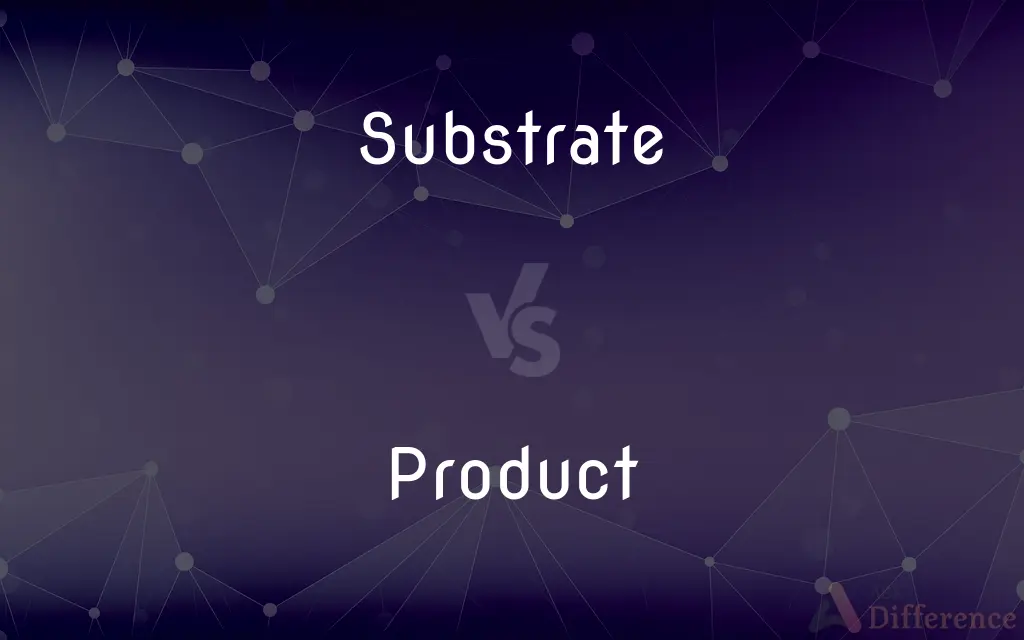Substrate vs. Product — What's the Difference?
Edited by Tayyaba Rehman — By Fiza Rafique — Updated on March 21, 2024
Substrates are specific reactants that enzymes act upon in biochemical reactions, while products are the substances formed as a result of these reactions.

Difference Between Substrate and Product
Table of Contents
ADVERTISEMENT
Key Differences
Substrate is the specific reactant that an enzyme binds to during a biochemical reaction, initiating the process. On the other hand, a product is the substance or substances formed as a result of the biochemical reaction, once the enzyme has catalyzed the substrate.
In enzymatic reactions, substrates fit into the enzyme's active site, starting the catalytic process. Whereas products are the outcome of this process, often released from the enzyme to participate in further reactions or cellular functions.
The substrate concentration can directly affect the rate of an enzymatic reaction, as more substrates increase the likelihood of enzyme-substrate complexes forming. Conversely, the accumulation of products can inhibit the reaction by feedback mechanisms or by physically obstructing the active site.
Substrates often require specific conditions such as pH and temperature to interact effectively with enzymes. In contrast, products do not influence the reaction conditions but are influenced by them, as their stability and further reactivity depend on the cellular environment.
The nature and structure of a substrate determine its specificity to an enzyme, guiding the type of reaction that will occur. On the other hand, the structure of the product is determined by the reaction mechanism and can provide insights into the enzyme's function and specificity.
ADVERTISEMENT
Comparison Chart
Definition
The reactant that an enzyme acts upon.
The substance(s) formed in a reaction.
Role in Reactions
Initiates the enzymatic process.
Result of the enzymatic process.
Interaction
Binds to the enzyme's active site.
Often released after the reaction.
Influence on Rate
Higher concentrations can increase the rate.
Accumulation may inhibit the reaction.
Conditions Required
Specific pH and temperature for activity.
Stability and reactivity depend on conditions post-reaction.
Compare with Definitions
Substrate
A substance on which an enzyme acts during a biochemical reaction.
Glucose is a common substrate in cellular respiration.
Product
The end result of a biochemical reaction involving enzymes.
Water and oxygen are products of the electron transport chain in cellular respiration.
Substrate
Often specific to the enzyme it reacts with.
The enzyme lactase specifically acts on the substrate lactose.
Product
Created from the transformation of substrates.
Amino acids are products of the hydrolysis of proteins by proteases.
Substrate
The starting point for enzymatic reactions.
The substrate sucrose breaks down into glucose and fructose in the presence of the enzyme sucrase.
Product
Can act as inhibitors in feedback loops.
Accumulation of product ATP can inhibit further ATP production.
Substrate
Its concentration can affect the reaction rate.
Increasing substrate concentration speeds up reactions until the enzymes are saturated.
Product
Can be one or multiple substances.
The breakdown of glucose produces several products, including ATP and water.
Substrate
Usually in the same physical state as the enzyme.
Most substrates in the body are aqueous, matching the enzymes' aqueous environment.
Product
Products are often more stable than the reactants.
The product water, formed in many reactions, is highly stable.
Substrate
The material or substance on which an enzyme acts.
Product
An item that is made or refined and marketed
Farm products.
Soaps, detergents, and similar products.
Travel products such as vacation trips.
Substrate
(Biology) A surface on which an organism grows or is attached.
Product
Such items considered as a group
Sold a lot of product in May.
Substrate
An underlying layer; a substratum.
Product
A preparation, such as a gel, used for styling hair
Began to use product soon after he became famous.
Substrate
(Linguistics) An indigenous language that contributes features to the language of an invading people who impose their language on the indigenous population.
Product
A substance resulting from a chemical or nuclear reaction.
Substrate
An underlying layer; a substratum.
Product
A direct result; a consequence
"Is history the product of impersonal social and economic forces?" (Anthony Lewis).
Substrate
The substance lining the bottom edge of an enclosure.
The substrate of an aquarium can affect the water's acidity.
Stream substrate affects fish longevity.
Product
A person whose characteristics or abilities are the result of certain influences or kinds of experience
"She is the product of an America in which explicit displays of pride in intellect are considered unseemly" (Yuval Levin).
Substrate
(biochemistry) A substance acted upon, as by an enzyme.
Product
The number or quantity obtained by multiplying two or more numbers together.
Substrate
(biology) A surface on which an organism grows, or to which an organism or an item is attached.
The rock surface of a rockpool is the substrate for a sessile organism such as a limpet.
Product
A scalar product.
Substrate
(linguistics) A language that is replaced in a population by another language and that influences the language imposed on its speakers.
Product
A vector product.
Substrate
(plating) A metal which is plated with another metal which has different physical properties.
Product
Anything that is produced; a result.
The product of last month's quality standards committee is quite good, even though the process was flawed.
Substrate
(construction) A surface to which a substance adheres.
Product
The amount of an artifact that has been created by someone or some process.
They improve their product every year; they export most of their agricultural production.
Substrate
To strew or lay under.
Product
A consequence of someone's efforts or of a particular set of circumstances.
Skill is the product of hours of practice.
His reaction was the product of hunger and fatigue.
Substrate
Having very slight furrows.
Product
(chemistry) A chemical substance formed as a result of a chemical reaction.
This is a product of lime and nitric acid.
Substrate
A substratum.
Product
(arithmetic) A quantity obtained by multiplication of two or more numbers.
The product of 2 and 3 is 6.
The product of 2, 3, and 4 is 24.
Substrate
Having very slight furrows.
Product
(mathematics) Any operation or a result thereof which generalises multiplication of numbers, like the multiplicative operation in a ring, product of types or a categorical product.
Substrate
To strew or lay under anything.
The melted glass being supported by the substrated sand.
Product
Any tangible or intangible good or service that is a result of a process and that is intended for delivery to a customer or end user.
Substrate
The substance acted upon by an enzyme or ferment
Product
A commodity offered for sale.
That store offers a variety of products.
We've got to sell a lot of product by the end of the month.
Substrate
Any stratum lying underneath another
Product
Any preparation to be applied to the hair, skin, nails, etc.
Wash excess product out of your hair.
Product
Illegal drugs, especially cocaine, when viewed as a commodity.
I got some product here – you buying?
Product
To produce.
Product
Anything that is produced, whether as the result of generation, growth, labor, or thought, or by the operation of involuntary causes; as, the products of the season, or of the farm; the products of manufactures; the products of the brain.
There are the productOf those ill-mated marriages.
These institutions are the products of enthusiasm.
Product
The number or sum obtained by adding one number or quantity to itself as many times as there are units in another number; the number resulting from the multiplication of two or more numbers; as, the product of the multiplication of 7 by 5 is 35. In general, the result of any kind of multiplication. See the Note under Multiplication.
Product
To produce; to bring forward.
Product
To lengthen out; to extend.
He that doth much . . . products his mortality.
Product
To produce; to make.
Product
Commodities offered for sale;
Good business depends on having good merchandise
That store offers a variety of products
Product
An artifact that has been created by someone or some process;
They improve their product every year
They export most of their agricultural production
Product
A consequence of someone's efforts or of a particular set of circumstances;
Skill is the product of hours of practice
His reaction was the product of hunger and fatigue
Product
A chemical substance formed as a result of a chemical reaction;
A product of lime and nitric acid
Product
A quantity obtained by multiplication;
The product of 2 and 3 is 6
Product
The set of elements common to two or more sets;
The set of red hats is the intersection of the set of hats and the set of red things
Common Curiosities
What is a substrate in a biochemical reaction?
A substrate is a specific reactant that an enzyme acts upon during a biochemical reaction.
What factors affect substrate binding to an enzyme?
Factors like pH, temperature, and the presence of inhibitors can affect substrate binding.
How do substrates and products relate to enzyme specificity?
Enzymes are specific to substrates due to their unique active sites, and this specificity determines the resulting products.
What role does substrate concentration play in enzymatic reactions?
Higher substrate concentrations generally increase reaction rates until enzymes become saturated.
How can the accumulation of products affect a reaction?
Product accumulation can inhibit a reaction by feedback inhibition or by blocking active sites.
How do substrates interact with enzymes?
Substrates bind to the active site of enzymes, initiating a conformational change that facilitates the reaction.
How does a substrate become a product?
A substrate is transformed into a product through a chemical reaction, often catalyzed by an enzyme.
Is it possible for one substrate to yield multiple products?
Yes, depending on the reaction, one substrate can be transformed into multiple products.
Can the structure of a product provide insights into the enzyme's function?
Yes, analyzing the structure of products can offer clues about the enzyme's specificity and the reaction pathway.
Can a product become a substrate in another reaction?
Yes, a product from one reaction can serve as a substrate in a subsequent reaction.
What happens to the product after a biochemical reaction?
Products may undergo further reactions, be used in cellular processes, or be removed from the cell.
Why is the specificity of a substrate important in biochemical reactions?
Specificity ensures that enzymes catalyze the correct reaction, leading to the desired product.
Are products always released from the enzyme after a reaction?
Yes, products are usually released so the enzyme can participate in additional reactions.
Can environmental conditions affect the formation of products?
Yes, conditions like temperature and pH can influence both the efficiency of product formation and the stability of the products.
What is the significance of substrate concentration in enzymatic regulation?
Substrate concentration is crucial for regulating the rate of enzymatic reactions, affecting both the initiation and the speed of the reaction.
Share Your Discovery

Previous Comparison
Preterite vs. Imperfect
Next Comparison
Moose vs. ElkAuthor Spotlight
Written by
Fiza RafiqueFiza Rafique is a skilled content writer at AskDifference.com, where she meticulously refines and enhances written pieces. Drawing from her vast editorial expertise, Fiza ensures clarity, accuracy, and precision in every article. Passionate about language, she continually seeks to elevate the quality of content for readers worldwide.
Edited by
Tayyaba RehmanTayyaba Rehman is a distinguished writer, currently serving as a primary contributor to askdifference.com. As a researcher in semantics and etymology, Tayyaba's passion for the complexity of languages and their distinctions has found a perfect home on the platform. Tayyaba delves into the intricacies of language, distinguishing between commonly confused words and phrases, thereby providing clarity for readers worldwide.















































